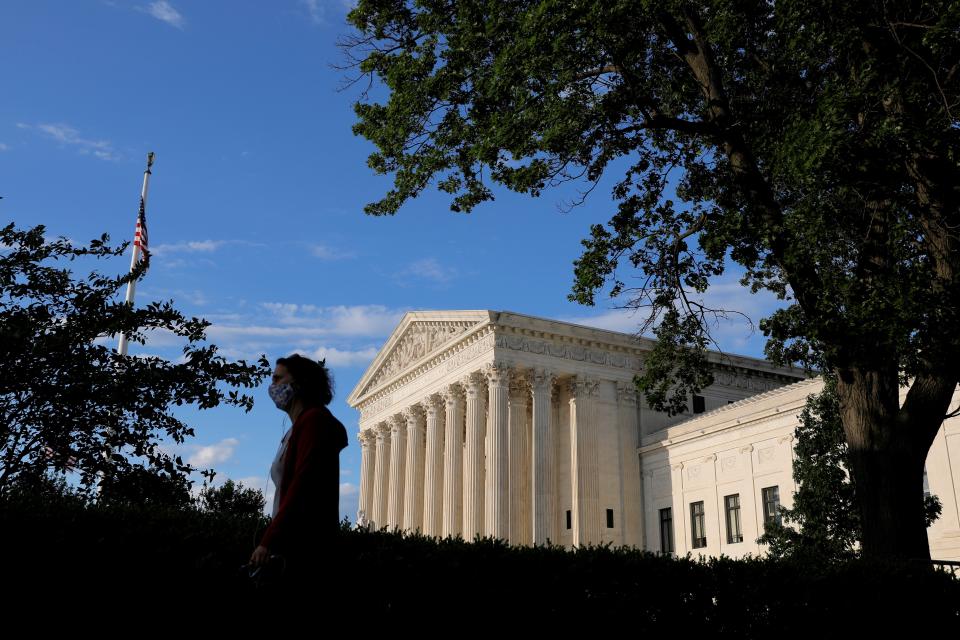Supreme Court to hear Mississippi abortion rights case posing challenge to Roe v Wade

The US Supreme Court will hear a case involving a Mississippi law banning most abortions after 15 weeks, potentially igniting a major challenge to the landmark abortion rights ruling in Roe v Wade.
The nation’s high court will consider whether “all pre-viability prohibitions on abortion are unconstitutional.”
It marks the first major abortion rights challenge in front of the three newest justices, all conservatives appointed by Donald Trump.
The court will begin hearing the case in its next term beginning in October, with a ruling expected in 2022.
The Center for Reproductive Rights sued on behalf of Jackson Women’s Health Organization, the state’s only abortion clinic, after a bill banning most abortions after 15 weeks was signed into law. It was set to be effective on 1 July, 2018.
In December, a three-judge federal appeals court panel agreed with a lower court ruling to block the law, teeing up the state to appeal to the Supreme Court.
The state legislature also passed a more restrictive law in 2019 that bans most abortions after six weeks. That law was also blocked in the courts.
In his 2018 ruling, US District Judge Carlton Reeves wrote that the legislature’s “professed interest in ‘women’s health’ is pure gaslighting.”
Appellate Judge Patrick Higginbotham said in a 2020 ruling than an “unbroken line dating to Roe v Wade” shows that the Supreme Court “established (and affirmed, and re-affirmed) a woman’s right to choose an abortion before viability. “
“States may regulate abortion procedures prior to viability so long as they do not impose an undue burden on the woman’s right but they may not ban abortions,” he said.
Louisiana passed a similar 15-week abortions ban, which would be effective pending an outcome in the Mississippi case.
The lawsuit argues that a foetus is not viable outside the womb at 15 weeks, and courts have shown that Mississippi has “conceded that it had identified no medical evidence that a fetus would be viable at 15 weeks.” Despite lack of evidence, Mississippi Governor Tate Reeves has falsely claimed that “established medical consensus” is that viability begins at 23 to 24 from the last menstrual period.
“The state chose to pass a law it knew was unconstitutional to endorse a decades-long campaign, fuelled by national interest groups, to ask the Supreme Court to overturn Roe v Wade,” Judge Reeves wrote in 2018. “This court follows the commands of the Supreme Court and the dictates of the United States Constitution, rather than the disingenuous calculations of the Mississippi Legislature.”
Abortion rights advocates have warned that the new conservative majority on the nation’s high court– with Trump appointees Neil Gorsuch, Brett Kavanaugh and Amy Coney Barrett – could undermine precedent established in the landmark 1973 Roe v Wade case, which protects the right to an abortion without excessive government restrictions.
“Alarm bells are ringing loudly about the threat to reproductive rights,” said Nancy Northrup, president and CEO of the Center for Reproductive Rights. “The Supreme Court just agreed to review an abortion ban that unquestionably violates nearly 50 years of Supreme Court precedent and is a test case to overturn Roe v Wade.”
Diane Derzis, owner of Jackson Women’s Health Organization, said in a statement that the clinic sees patients “who have spent weeks saving up the money to travel here and pay for childcare, for a place to stay, and everything else involved.”
“If this ban were to take effect, we would be forced to turn many of those patients away, and they would lose their right to abortion in this state,” she said. “Mississippi politicians have created countless barriers for people trying to access abortion, intentionally pushing them later into pregnancy. It’s all part of their strategy to eliminate abortion access entirely.”
The Mississippi law is among dozens of anti-abortion bills filed within recent years. This year, more than 500 restrictions on abortion have been introduced in state houses across the US. Of those, 61 have become law.
Read More
The Independent visits Heathrow ahead of international travel restarting

 Yahoo Finance
Yahoo Finance 